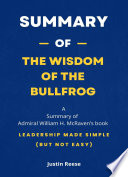

The concept of leadership through service emphasizes the importance of serving others as a pathway to effective leadership. It suggests that a true leader prioritizes the needs of their team, fostering an environment where individuals feel valued and empowered. By adopting a servant leadership approach, leaders can build trust, enhance collaboration, and drive performance. This idea is rooted in the belief that when leaders put their team first, they create a culture of loyalty and commitment, which ultimately leads to better outcomes for the organization.
Continue readingEmotional intelligence (EI) is a critical component of successful leadership. It involves the ability to recognize, understand, and manage one's own emotions and the emotions of others. Leaders with high EI can navigate complex interpersonal dynamics, resolve conflicts, and inspire their teams. The book highlights the idea that emotional intelligence is not just a nice-to-have skill but a necessity in today’s fast-paced and often stressful work environments. Leaders who cultivate EI can foster stronger relationships and create a more resilient and adaptive workforce.
Continue readingStorytelling is presented as a powerful tool for leaders to communicate their vision and values. Through stories, leaders can connect with their audience on an emotional level, making their messages more relatable and memorable. The book discusses how effective storytelling can inspire action, foster engagement, and create a shared sense of purpose within teams. By mastering the art of storytelling, leaders can enhance their influence and drive organizational change more effectively.
Continue readingIn a rapidly changing world, adaptability and resilience are essential traits for leaders. The book emphasizes that leaders must be willing to embrace change, learn from failures, and remain flexible in their approach. Resilience is about bouncing back from setbacks and maintaining a positive outlook despite challenges. By cultivating these qualities, leaders can guide their teams through uncertainty and inspire confidence in their ability to navigate future obstacles.
Continue readingTrust is the foundation of effective leadership. The book discusses the importance of fostering a culture of trust within organizations, where team members feel safe to express their ideas and concerns. Leaders can build trust by being transparent, consistent, and reliable in their actions. A culture of trust encourages open communication, collaboration, and innovation, leading to improved team performance and morale.
Continue readingVisionary thinking is the ability to see beyond the present and envision a future that inspires action. The book highlights the role of leaders in setting a compelling vision for their organization and rallying their teams around it. Visionary leaders not only articulate their goals but also create a roadmap for achieving them. This forward-thinking approach is essential for driving strategic initiatives and fostering a sense of purpose among team members.
Continue readingThe importance of continuous learning is underscored as a vital aspect of leadership. The book argues that effective leaders are lifelong learners who seek to improve their skills and knowledge. By prioritizing personal and professional development, leaders can stay relevant in their fields and inspire their teams to do the same. This commitment to learning fosters a culture of growth and innovation within organizations.
Continue readingThe reading time for Summary of The Wisdom of the Bullfrog depends on the reader's pace. However, this concise book summary covers the 7 key ideas from Summary of The Wisdom of the Bullfrog, allowing you to quickly understand the main concepts, insights, and practical applications in around 21 min.
Summary of The Wisdom of the Bullfrog is definitely worth reading. The book covers essential topics including Leadership Through Service, Emotional Intelligence in Leadership, The Power of Storytelling, providing practical insights and actionable advice. Whether you read the full book or our concise summary, Summary of The Wisdom of the Bullfrog delivers valuable knowledge that can help you improve your understanding and apply these concepts in your personal or professional life.
Summary of The Wisdom of the Bullfrog was written by Justin Reese.
If you enjoyed Summary of The Wisdom of the Bullfrog by Justin Reese and want to explore similar topics or deepen your understanding, we highly recommend these related book summaries:
These books cover related themes, complementary concepts, and will help you build upon the knowledge gained from Summary of The Wisdom of the Bullfrog. Each of these summaries provides concise insights that can further enhance your understanding and practical application of the ideas presented in Summary of The Wisdom of the Bullfrog.